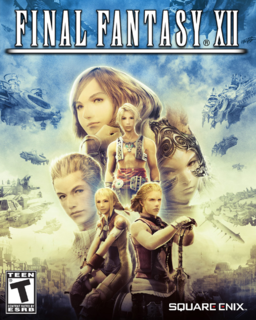The latest FF doesn't just beat the high expectations set for it; it smashes right through them and doesn't look back.
Set in the world of Ivalice, you'll first meet Vaan, and eventually five companions (among them a ski pirate and a princess), and play through a story of clashing empires with a heavy political leaning, far different than the typical evil wizard/dragon/demon story-driver we're so used to seeing. A fair amount of character development and personal struggle with choosing vengeance or peace make for an interesting story, and one that demands more attention than most FF stories. While there's still the standard levelling-up to do, skills are now acquired via a 'license board.' It's similar in style to FF-X's sphere grid, and while some may gripe that you can't see everything (only skills adjacent to ones you possess are visible), it's immediately clear that moving in a given direction opens related skills, allowing you to still plan each character's development. Combat is now controlled by a 'gambit' system, that allows for setting up a string of a dozen BASIC-style if-then statements to govern character actions. Individual commands, or the entire system, can be shut off on a character-by-character basis, and you can always manually issue a command when the need arises. It's a powerful system, it works well, and you should expect to see it ripped off by many RPGs in the near future. Another major switch is a move away from random battles. You now traverse open fields and dungeon crawl in a fully-3D environment, and can see monsters ahead of time, giving you the opportunity to charge into battle or try to side-step past them.
Two of the best features of the game are happily on constant display: both the graphics and sounds are breathtaking, to the point that even the party menu screens generate a 'living in the not-too-distant future' feeling the first time you view them. Played on a Dolby surround system, the sounds never fail to impress, especially when the rear speakers kick in during some cut-scenes. The gambit system really adds a powerful new dynamic that pays for itself just in the time that it saves. Being able to set up to a dozen context-specific commands to handle healing (ex. if someone's HP drop to 30%, heal them), take advantage of monsters' weaknesses (if a monster's weak to fire, cast a fire spell), and set up defenses (re-cast Haste as soon as it wears off) can take a battle that would have taken a minute or more in most games, and have it wrapped up in ten to fifteen seconds. Equipping items now comes with an 'Optimize' command that sets your equipment for you, and while you may not always agree with its choices, it's a pretty good tie-breaker for when you're just not sure if you should switch to a newly acquired shield or sword. Wrapped around all the improvements are a very lengthy quest, and tons of sidequests, all of which are fun. Whether doing the game-long story arc of hunting monster bounties, joining two lost loves, solving a mentally taxing multi-component puzzle, or tackling an optional dungeon to get a new summon or power, there's always a diversion waiting to be tackled in addition to the main plot.
The negatives are few, and generally only minor inconveniences at that. A few places go a bit too long without offering save crystals, and while there is also a subset of them that additionally let you teleport between crystals, some sort of warp spell to return to towns might've stopped some backtracking. Some of the best armors and accessories have such steep penalties to use, that once you acquire them you'll kick yourself for spending the time to get them. The difficulty in getting your hands on them should've been penalty enough. Summons, here called Espers, are so expensive to use from a magic point standpoint, that once you acquire them, you might never bother to use them. The end game gets a little lengthy in the narrative, with several too-long cut scenes that don't add that much to the affair, and once you commit to the end game, while they do tell you you can't return to the rest of the game, they regrettably don't tell you there'll be no place to save.
There's really very little left to say about how excellent the game is. It's like watching a well-done animated movie at times, and with wide-screen support, you really get much more immersed than most other FF games. Just doing the main story should let one get close to 80 hours out of their money, and trying to do all there is can double that time. In the end, the game proves that it's okay to get a reputation as a company whose games get endlessly delayed if you additionally maintain your sterling reputation of putting out amazing games that deliver seemingly endless fun.

